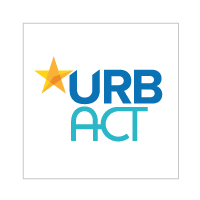URBACT measures to face Covid-19
Edited on
23 April 2020In the wake of the Covid-19 outbrake, what is the URBACT Joint Secretariat doing to prevent its spread and support cities?

Given the recent circumstances and the public announcement by the French national authorities, the URBACT Joint Secretariat - which is based in Paris (FR) - is giving preference to remote work. Other concerned members of the URBACT community, who are based all over Europe, were contacted in early March and advised to limit their travels. Some general recommendations included:
- To assess the situation based on up to date recommendations from the World Health Organisation (WHO), national embassies, national health organisations and partner organisations.
- To cancel meetings or avoid travelling exclusively if there is an official travel ban or travel warning for the region concerned by the trip or if a partner organisation restricts travels and/or meetings or for other justified medical conditions.
- To apply preventive measures as suggested by the WHO and similar organisations and to discuss them also with the partner organising the meeting, for example by making hand sanitisers available at the meeting venue.
URBACT recognises the impact the global pandemic on the network’s activities. The uncertainty around how and when travel restrictions will be lifted across Europe linked to the Covid-19 makes it highly risky to foresee physical meetings and events in the coming months. Moreover, it is impossible to predict how different measures in place will evolve, nor when public authorities would allow their agents to travel again in the remainder of 2020.
URBACT is adapting to the new situation, accompanying cities and experts to build the skills they need to work within their cities and with their counterparts across Europe. For the reasons listed above, the Joint Secretariat, alongside the Member and Partner States on the URBACT’s Monitoring Committee, have taken a series of decisions in this regard:
- The programme’s timeline has been carefully reviewed and modified. The official project end date for the Transfer Networks has been extended by 6 months (from January to June 2021), specific phases of work, such as the Sharing Period co-organised with URBACT’s National URBACT Points will be rescheduled. For the new batch of Action Planning Networks, the approval date for Phase 2 remains in May 2020. Nevertheless, there has been an extension of 3 months (end date in August 2022), so beneficiaries can use better the first months to adjust their workplans. All network’s activities, related programme’s milestones and administrative tasks will be adjusted accordingly.
- Exchange and ideas coming from beneficiaries and experts are welcome in the internal online platform (Basecamp). Dialogue with the Joint Secretariat is highly encouraged. Likewise network’s are welcome to use their own online private spaces for similar exchanges with their project partners and local stakeholders.
- URBACT will provide support and guidance on digital working at network and local level to support the redesign of beneficiaries’ activities and meetings in the short and medium term. Members of the Joint Secretariat will eventually join some of those meetings, like the Action Planning Networks’ Phase 2 individual kick-off meetings online.
- Other capacity-building trainings at programme level, either for Lead Partners and Lead Experts or for URBACT Local Group’s Coordinators, will be delivered using online formats and digital tools. The Phase 2 Kick-off Meeting for Action Planning Networks will still be held in early June, using URBACT’s online channels.
For more information, check the WHO guidance or contact the URBACT team.
 Submitted by URBACT on
Submitted by URBACT on
